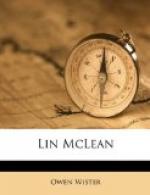How could I tell her that Nate’s death was the best end that could have come to him? But I said: “You know you don’t think it was your fault. You know you would do the same again.” She listened to me, but her eyes had no interest in them. “He never knew pain,” I pursued, “and he died doing the thing he liked best in the world. He was happy and enjoying himself, and you gave him that. It’s bad only for you. Some would talk religion, but I can’t.”
“Yes,” she answered, “I can think of him so glad to be free. Thank you for saying that about religion. Do you think it’s wicked not to want it— to hate it sometimes? I hope it’s not. Thank you, truly.”
During our journey she summoned her cheerfulness, and all that she said was wholesome. In the robust, coarse soundness of her fibre, the wounds of grief would heal and leave no sickness—perhaps no higher sensitiveness to human sufferings than her broad native kindness already held. We touched upon religion again, and my views shocked her Kentucky notions, for I told her Kentucky locked its religion in an iron cage called Sunday, which made it very savage and fond of biting strangers. Now and again I would run upon that vein of deep-seated prejudice that was in her character like some fine wire. In short, our disagreements brought us to terms more familiar than we had reached hitherto. But when at last Separ came, where was I? There stood Mr. McLean waiting, and at the suddenness of him she had no time to remember herself, but stepped out of the stage with such a smile that the ardent cow-puncher flushed and beamed.
“So I went away without telling you goodbye!” he began, not wisely. “Mrs. Pierce has been circulating war talk about me, you bet!”
The maiden in Jessamine spoke instantly. “Indeed? There was no special obligation for you to call on me, or her to notice if you didn’t.”
“Oh!” said Lin, crestfallen. “Yu’ sure don’t mean that?”
She looked at him, and was compelled to melt. “No, neighbor, I don’t mean it.”
“Neighbor!” he exclaimed; and again, “Neighbor,” much pleased. “Now it would sound kind o’ pleasant if you’d call me that for a steady thing.”
“It would sound kind of odd, Mr. McLean, thank you.”
“Blamed if I understand her,” cried Lin. “Blamed if I do. But you’re going to understand me sure quick!” He rushed inside the station, spoke sharply to the agent, and returned in the same tremor of elation that had pushed him to forwardness with his girl, and with which he seemed near bursting. “I’ve been here three days to meet you. There’s a letter, and I expect I know what’s in it. Tubercle has got it here.” He took it from the less hasty agent and thrust it in Jessamine’s hand. “You needn’t to fear. Please open it; it’s good news this time, you bet!” He watched it in her hand as the boy of eight watches the string of a Christmas parcel he wishes his father would cut instead of so carefully untie. “Open it,” he urged again. “Keeping me waiting this way!”




